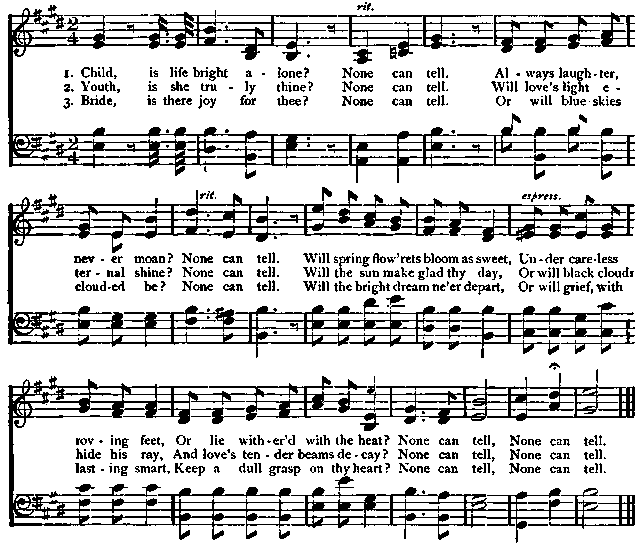Franklin Square Song Collection - online songbook
200 favorite songs and Hymns for Schools, Homes Lyrics & Sheet Music
| Share page | Visit Us On FB |
|
54 |
FRANKLIN-SQUARE SONG COLLECTION. |
|||
|
The Moonlight Sonata.—The Wide-Awake Magazine tells a pretty story of the way that Beethoven composed this beautiful piece of .music. He was going by a small house one evening and heard some one playing his Symphony in F on the Piano. He stopped to listen, and heard a voice say: " What would I not give to hear that piece played by some one who could do it justice." The great composer opened the door and entered. " Pardon me," said Beethoven, somewhat embarrassed; " pardon me, but I heard music, and was tempted to enter. I am a musician!" The girl blushed, and the young man assumed a grave, almost severe manner. '• I heard also some of your words," continued Beethoven. " You wish to hear, that is, you would like—in short, |
would you like me to play to you?" There was something so strange, so comical in the whole affair, and something so agreeable and eccentric in Beethoven's manner, that we all involuntarily smiled. "Thank you," said the young shoemaker; "butoui piano is bad, and then we have no music." "No music?" repeated Beethoven, "how, then, did mademoiselle—." He stopped and colored, for the young girl had just turned towards him, and by her sad, veiled eyes he saw that she was blind. " I entreat you to pardon me," stammered he: "but I did not remark at first. You play, then, from memory ?" " Entirely!" " And where have you heard this music before?" "Never, excepting the music in the streets." She seemed frightened, so Beethoven did not |
|||
|
NONE CAN TELL.
Con anima. . |
W. H. Emra. G. B. Allen. |
|||
 |
||||
|
|
||||
|
add another word, but seated himself at the instrument and began to play. He had not touched many notes when I guessed, says the narrator, who accompanied him, what would follow, and how sublime he would be that evening. I was not deceived. Never, during the many years I knew him, did I hear him play as on this occasion for the blind girl and her brother on that old dilapidated piano. At last the shoemaker rose, approached him, and said in a low voice: " Wonderful man, who are you then?" Beethoven raised his head, as if he had not comprehended. The young man repeated the question. The composer smiled as only he could smile. "Listen," said he; and he played the first movement in the F Symphony. A cry of joy escaped |
from the lips of the brother and sister. They recog. nized the player and cried: " You are, then, Beethoven !" He rose to go, but they detained him. " Play for us once more, just once more," they said. He allowed himself to be led back to the instrument. The brilliant rays of the moon entered the curtain-less windows and lighted up his broad, earnest, and expressive forehead. " I am going to improvise a sonata to the moonlight," he said, playfully. He contemplated for some moments the sky sparkling with stars; then his fingers rested on the piano, and he began to play in a low, sad, but wondrously sweet strain. The harmony issued from the instrument as sweet and even as the bright rays of the beautiful moonlight spread over the shadows on the ground. |
|||